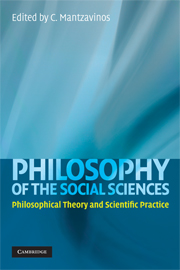Book contents
- Frontmatter
- Contents
- List of Contributors
- Acknowledgements
- Introduction
- Part I Basic Problems of Sociality
- Part II Laws and Explanation in the Social Sciences
- Part III How Philosophy and the Social Sciences Can Enrich Each Other: Three Examples
- 8 Why Do People Cooperate as Much as They Do?
- Comment
- 9 Situations Against Virtues: The Situationist Attack on Virtue Theory
- Comment
- 10 What Kind of Problem is the Hermeneutic Circle?
- Comment
- Epilogue
- Name Index
- Subject Index
- References
9 - Situations Against Virtues: The Situationist Attack on Virtue Theory
Published online by Cambridge University Press: 05 June 2012
- Frontmatter
- Contents
- List of Contributors
- Acknowledgements
- Introduction
- Part I Basic Problems of Sociality
- Part II Laws and Explanation in the Social Sciences
- Part III How Philosophy and the Social Sciences Can Enrich Each Other: Three Examples
- 8 Why Do People Cooperate as Much as They Do?
- Comment
- 9 Situations Against Virtues: The Situationist Attack on Virtue Theory
- Comment
- 10 What Kind of Problem is the Hermeneutic Circle?
- Comment
- Epilogue
- Name Index
- Subject Index
- References
Summary
Why did Tom give up his seat on the bus to someone frail and elderly? Perhaps only to impress his girlfriend, perhaps rather to be considerate, out of concern for the elder's welfare. Or maybe it was just a random act, entirely out of character, and due only to his being in a good mood. Alternatively, it might be quite in character for him to act that way. Kindness may be one of his character traits, manifest in that act.
Or so one might think without a second thought. Such reasoning seems typical of how we constantly try to understand people's conduct. Based on a body of troubling results in social psychology, however, an intriguing critique has been pressed against such character trait attributions. Here we shall review the most striking, best known results, and the arguments based on them.
The Attack Presented
The Milgram Experiments
In the early sixties, experiments conducted by the psychologist Stanley Milgram at Yale University had disturbing results (Milgram 1963, 1974). In multiple replications, moreover, the results have held up with impressive consistency. Milgram's experimental subjects believe themselves to be participating in a study of the effects of punishment on learning, and to be playing the role of “teachers” in that study. Here is the scenario. The experimental subjects are expected to administer electric shocks to “learners” (who are in fact Milgram confederates). In one version, the teacher/subject sees the learner/confederate strapped down to an electric chair in a separate room.
- Type
- Chapter
- Information
- Philosophy of the Social SciencesPhilosophical Theory and Scientific Practice, pp. 274 - 290Publisher: Cambridge University PressPrint publication year: 2009
References
- 11
- Cited by



